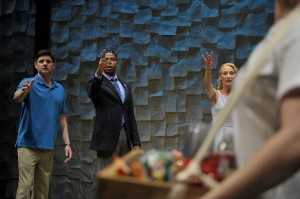IF ONLY IT WENT LIKE THIS MORE OFTEN
I can’t call Neil LaBute’s works timeless, but both his plays and films (In the Company of Men) are a product of our time. As America holds herself to be a beacon of tolerance, LaBute’s inflammatory social commentary, as seen through a moralistic and fairly misanthropic lens, sheds light on the darker aspects of our  nature. His work is refreshingly politically incorrect, often engaging us with the unresolved issues – race, misogyny, emotional terrorism, etc. – that are bubbling just below the artificial surface which censorship has created in America. This provocateur’s frank and often brash observations have been known to turn off, or better yet, infuriate audience members (hooray, I say). Indeed, his Bash: Latter-Day Plays (1999) led to a disfellowship from the LDS church, which meant he could still tithe but could not teach a lesson or offer a public prayer (LaBute has since left the church). His Mormon background no doubt fuels his writings, which often take on the hypocrisy of the belief systems into which we are born.
nature. His work is refreshingly politically incorrect, often engaging us with the unresolved issues – race, misogyny, emotional terrorism, etc. – that are bubbling just below the artificial surface which censorship has created in America. This provocateur’s frank and often brash observations have been known to turn off, or better yet, infuriate audience members (hooray, I say). Indeed, his Bash: Latter-Day Plays (1999) led to a disfellowship from the LDS church, which meant he could still tithe but could not teach a lesson or offer a public prayer (LaBute has since left the church). His Mormon background no doubt fuels his writings, which often take on the hypocrisy of the belief systems into which we are born.
LaBute may be mass-produced, but this is not to say that his volcanic output is consistent. Break of Noon (2010), about a man who turns evangelist after surviving a mass shooting, and In a Forest Dark and Deep (2011), about two siblings with  dark secrets, never live up to their premise. The Mercy Seat (2002), about the effect (or lack thereof) of 9/11 on two lovers, is compelling but somewhat repetitive. Both reasons to be pretty (2008) and reasons to be happy (which just ended a well-reviewed Off Broadway run last week) see a gentler LaBute emerging as he grapples with the complexities of relationships. Love him or hate him, LaBute’s not going away any time soon: As theater companies clutch their collective purses, LaBute’s small-cast scripts, many of which can be produced with little scenery, will be revived more and more, even as he continues cranking out new ones.
dark secrets, never live up to their premise. The Mercy Seat (2002), about the effect (or lack thereof) of 9/11 on two lovers, is compelling but somewhat repetitive. Both reasons to be pretty (2008) and reasons to be happy (which just ended a well-reviewed Off Broadway run last week) see a gentler LaBute emerging as he grapples with the complexities of relationships. Love him or hate him, LaBute’s not going away any time soon: As theater companies clutch their collective purses, LaBute’s small-cast scripts, many of which can be produced with little scenery, will be revived more and more, even as he continues cranking out new ones.
 The prolific playwright offers jigsaw puzzle-like construction reminiscent of Pinter, and colloquial language similar to Mamet. The results can be extraordinary, evidenced by Aurora Theatre Company’s current revival of This Is How It Goes (2005), which is thoroughly engaging for its dramaturgy, incendiary dialogue, and typical LaBute twists and turns. Even as the play sometimes feels like a manipulative shell game for LaBute’s platform – that men are filthy pigs and women are imperfect and easily victimized – the propulsive dialogue pops and crackles, especially as delivered by a crackerjack trio of stunning actors.
The prolific playwright offers jigsaw puzzle-like construction reminiscent of Pinter, and colloquial language similar to Mamet. The results can be extraordinary, evidenced by Aurora Theatre Company’s current revival of This Is How It Goes (2005), which is thoroughly engaging for its dramaturgy, incendiary dialogue, and typical LaBute twists and turns. Even as the play sometimes feels like a manipulative shell game for LaBute’s platform – that men are filthy pigs and women are imperfect and easily victimized – the propulsive dialogue pops and crackles, especially as delivered by a crackerjack trio of stunning actors.
 The play is calculating because our narrator tells us from the start that he “might end up being an unreliable narrator.” In fact, as the plot unfolds via his fluctuating remembrances, the Man (as he is curiously known) continually drops intimations that his storytelling – which begins with “this is how it goes” – may not be entirely accurate. He has returned unemployed and broke to the small Midwest town where he grew up, to begin life anew. He chances upon Belinda (even more curiously named Woman in the program), the looker he once adored from afar. She is now married (with kids) to Cody, the erstwhile track star and current successful businessman. The crux here is that Cody is an attitude-drenched, unlikeable and righteous black man who may be losing his wife to this likeable (maybe) and innocent (maybe) ex-classmate, who becomes a boarder at their home.
The play is calculating because our narrator tells us from the start that he “might end up being an unreliable narrator.” In fact, as the plot unfolds via his fluctuating remembrances, the Man (as he is curiously known) continually drops intimations that his storytelling – which begins with “this is how it goes” – may not be entirely accurate. He has returned unemployed and broke to the small Midwest town where he grew up, to begin life anew. He chances upon Belinda (even more curiously named Woman in the program), the looker he once adored from afar. She is now married (with kids) to Cody, the erstwhile track star and current successful businessman. The crux here is that Cody is an attitude-drenched, unlikeable and righteous black man who may be losing his wife to this likeable (maybe) and innocent (maybe) ex-classmate, who becomes a boarder at their home.
Don’t be put off by the presentationalism of Gabriel Marin, who begins the 90-minute play as one with a manic disorder who stopped taking medication. Marin eventually settles into the role of the Man, a wisecracking, ferrety interloper who dreams of writing for the stage (indeed, Kim A. Tolman’s simple set design has the  back wall of the stage littered with pages of a script, emphasizing the subjectivity of our narrator).
back wall of the stage littered with pages of a script, emphasizing the subjectivity of our narrator).
Carrie Paff played three distinct roles in The Other Place at Magic Theatre so convincingly that it could be believed she was three separate actresses. Here, she plays Belinda’s different facets with equal dexterity: The woman who seeks solace from a crumbling marriage; the woman who covers up loneliness and confusion behind a perky façade; and the woman whose pursuit of happiness helps to keep her blinded from the truth.
 Aldo Billingslea bravely offers a portrait of Cody as threatening, suspicious and aggressive, but it is an empathetic portrayal. Cody is an overachiever, but his bravado is clearly compensation for how tough it must be for a black man to succeed in a mostly white environment. Billingslea never tries to gain our sympathy by downplaying his character’s well-deserved anger; instead, he steamrolls and snorts like a bull, making Cody repulsive and hypnotizing at the same time.
Aldo Billingslea bravely offers a portrait of Cody as threatening, suspicious and aggressive, but it is an empathetic portrayal. Cody is an overachiever, but his bravado is clearly compensation for how tough it must be for a black man to succeed in a mostly white environment. Billingslea never tries to gain our sympathy by downplaying his character’s well-deserved anger; instead, he steamrolls and snorts like a bull, making Cody repulsive and hypnotizing at the same time.
Aurora’s thrust stage is the ideal setting for the play, and Artistic Director Tom Ross’s tight and fluid blocking creates an air of tension which is palpable. LaBute’s inciting play, which includes racial epithets, may cover some of his familiar tropes, but there is immediacy to the cat-and-mouse proceedings – not to mention a delicious sense of eavesdropping for the audience. I can’t recommend it highly enough.
photos by David Allen
This Is How It Goes
Aurora Theatre in Berkeley
scheduled to end on July 28, 2013
for tickets, call (510) 843-4822 or visit http://www.auroratheatre.org
